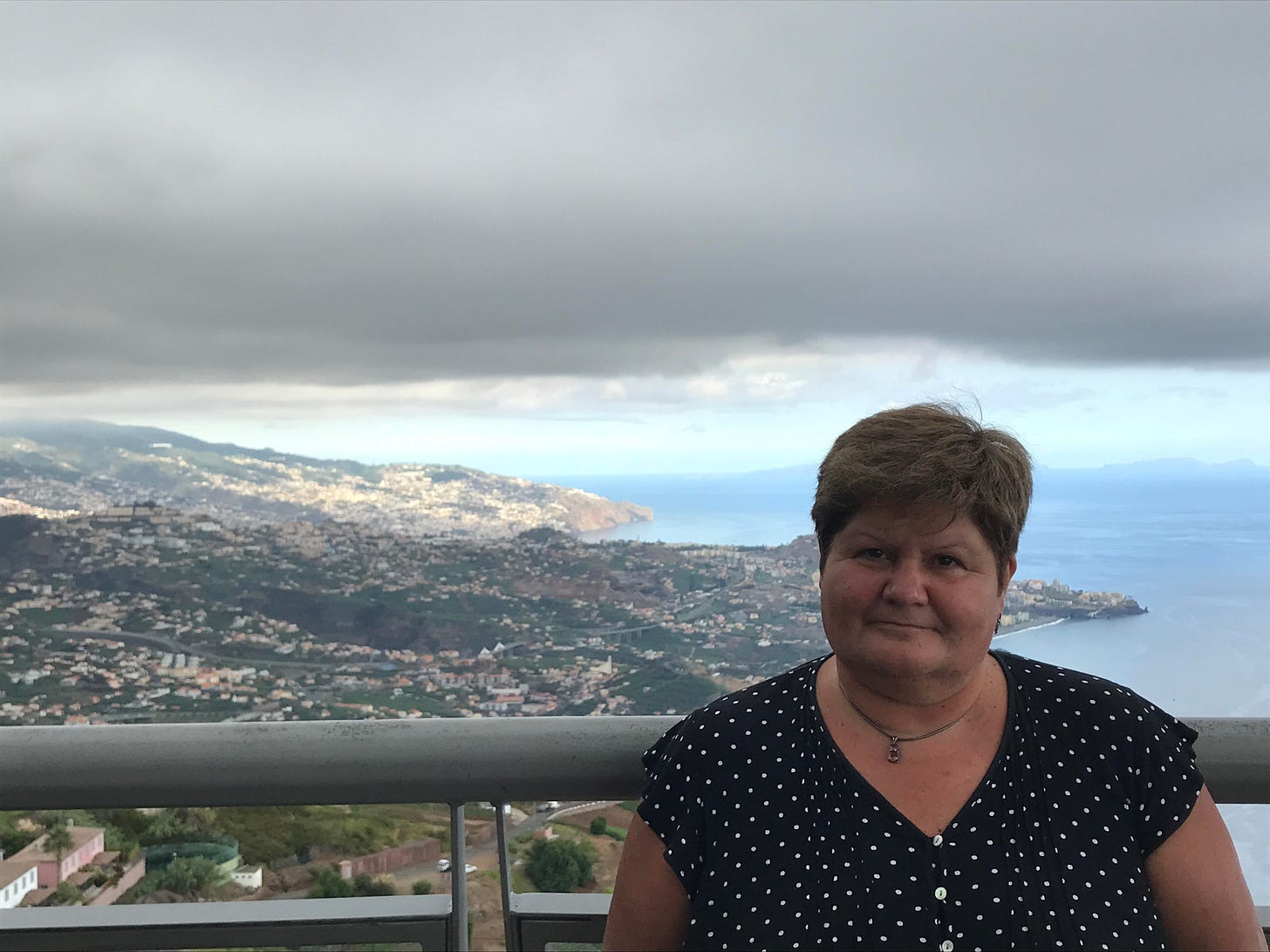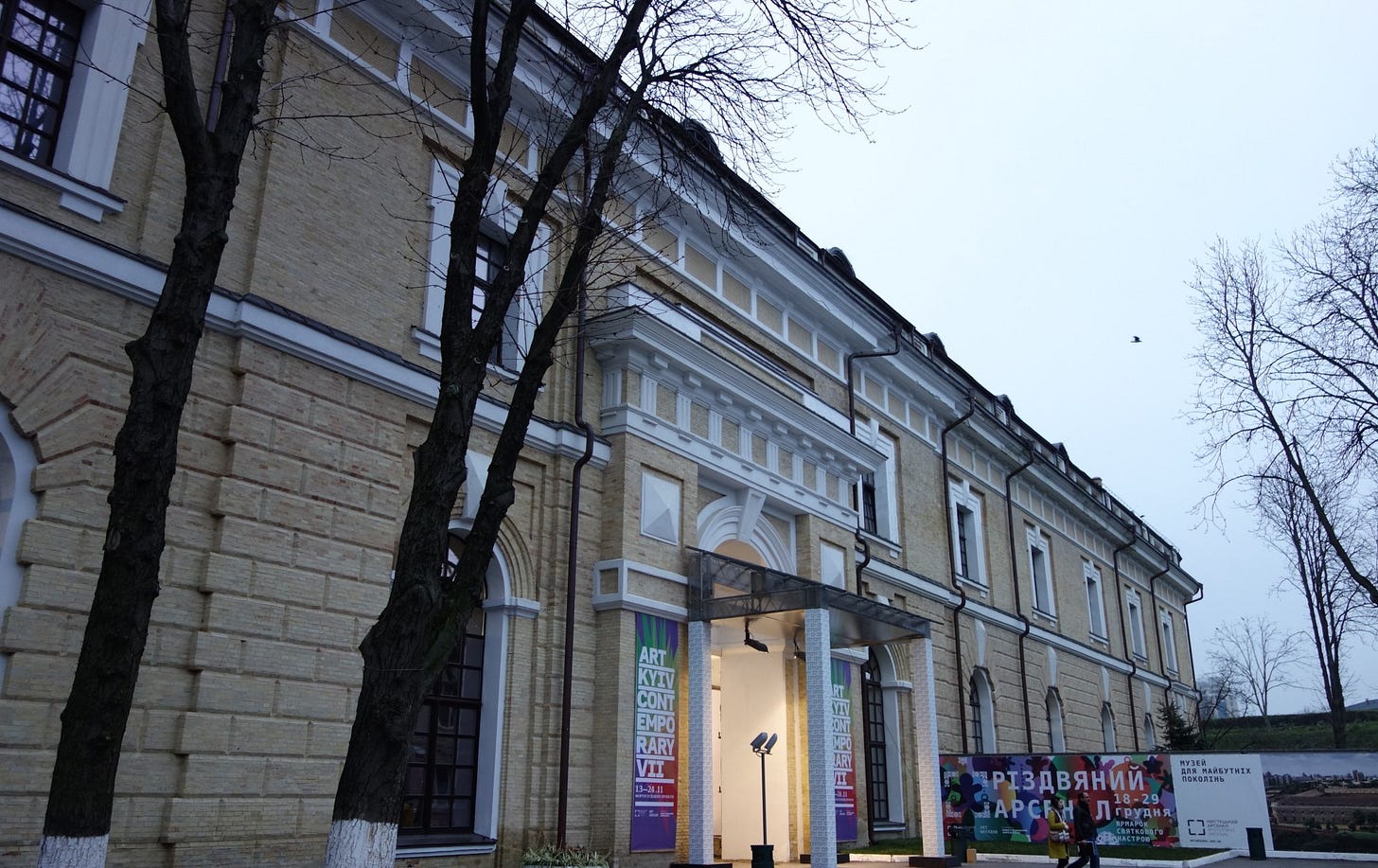The Book Arsenal
Ukrainian publisher Anetta Antonenko has her books, her cats, her language—and her gun.
Dear friends,
Like all of us, I have been sitting here all week asking myself: What can I do? There’s not much. But it made me feel better to write this piece for The Nation, in which I interview my Ukrainian publisher Anetta Antonenko, who is also the Ukrainian publisher of Clarice Lispector, born in Ukraine.
If you saw Anetta walking around a book fair in Frankfurt or London, you wouldn’t be especially frightened. She’s short, sweet, and likes to talk about books. But if the Ukrainians surprised people outside Ukraine with their unity and determination, Anetta says here, they didn’t surprise themselves.
It’s a tiny contribution, but it made me feel better to write this. It’s also available in español, português, Nederlands, and français, with versions in other languages coming soon.
Please share it: it’s so important to show our support to the cultural world at this horrifying time. And if you can, support Ukrainian writers by buying some of the books she recommends.
I was also proud to add my name to this letter from International PEN supporting Ukrainian culture.
I hope you’re all sleeping at least a little.
Warmest wishes,
B.
Mystetskyi Arsenal National Art and Culture Museum Complex, also known as Mystetskyi Arsenal, is Ukraine's flagship cultural institution, a museum and art exhibition complex located at Lavrska Street, 10-12, in Kyiv, Ukraine. (Photo by Гатерас, CC BY-SA 4.0)
A decade ago, I was in Paris attending the Salon du Livre, France’s largest book convention, which gathers publishers from all over the world.
Officially, I was there to present the French translation of my biography of Clarice Lispector, but I also had a secret mission: I wanted to meet Ukrainian publishers so that Lispector could be read in the land where she was born. Exactly a hundred years ago, she and her family had fled, taking the same roads and even the same streets that desperate Ukrainian refugees are taking today.
I didn’t know any Ukrainian publishers. I wasn’t an agent; I didn’t have any idea how to do this; I just felt that it was important; and when I finally located a solitary Ukrainian publisher, a middle-aged woman named Anetta Antonenko, I tried to tell my story.
Lispector was Brazil’s greatest modern writer, I said. She was so brilliant, so magnetic, that her compatriots wear themselves out in trying to describe “the princess of the Portuguese language.” And this proud symbol of Brazilian culture was born in Ukraine.
“It’s a matter of national pride, of correcting a historical injustice, to bring her back to her birthplace,” I said.
We must have looked like a comical pair. I am almost twice Anetta’s size. Neither of us spoke much of the other’s language. Yet, in that miraculous way that happens among people who are meant to understand each other, we understood each other.
Soon after, Anetta Antonenko Publishers started issuing Clarice’s work. She has now published three of her novels, and is preparing a Ukrainian edition of The Passion According to G.H. She is also the Ukrainian publisher of Bataille, Lorca, and Borges, and was expecting—this week, of all times—a translation of my biography of Susan Sontag.
A few days ago, she wrote that her father was a soldier and her mother was a doctor: “I know how to shoot, and I know how to heal.” Now, this kind and cultured woman is sitting in an apartment in a formerly quiet neighborhood, just three kilometers from Kyiv Central Station.
“I’m in my own house,” she said when we talked over WhatsApp this weekend. “I have my two cats with me, and I don’t want to hide. I refuse to be afraid in my own country. So I work as much as I can. Work saves.”
She has food stocked up for 10 to 15 days for herself—and for a month for her cats. And like millions of Ukrainian civilians, she has a gun. When she was 20, her father taught her how to shoot, and even though she turned 60 in January, she’s ready to use it if needed.
“I’m not afraid to fight. But I believe that words are a significant contribution to our victory. I have received a lot of moral support from publishers, agents, authors, translators, embassies, and foundations. I do everything I can to help get the word out about our situation.”
She started publishing books exclusively in the Ukrainian language at a time when, in the largely bilingual country, much literature was available only in Russian. Antonenko, like most Ukrainians of her generation, is fluent in Russian.
“Ukraine was the most highly educated part of the former Soviet Union. We, not Russia, were always the nation that read the most books. My sacred conviction is that the nation is its language. And when Russia invaded us and occupied Crimea and the Donbass, I decided that publishing in Ukrainian was the best way that I could help my country.”
Her persistence paid off: “The economic situation was bad. Morally and financially, it was hard. But we reached our five-year budget targets in only three.” She benefited from a renaissance in the language. In the past few years, she said, “there’s been a noticeable increase in the use of Ukrainian, both in public and in private.”
Antonenko compares the occupation of Ukrainian territory with the occupation of Ukrainian literature. “They ‘appropriated’ our writers—Gogol, Bulgakov, Babel—and called them Russian. Now they have invaded our land and want to call it Russia.”
She is now calling on the book world to support Ukraine by ending collaboration with Russia. “We’re talking about not allowing Russian stands at book fairs. Not giving publishing fellowships. And agents shouldn’t give Ukrainian rights to Russian publishers. Ignore Russian publishers who say they have nothing to do with politics. They’ve been silent. They are also to blame.”
Like so many Ukrainians, Antonenko is frustrated that previous Ukrainian warnings were not taken seriously. “We’ve been saying this for years.” The nation itself wasn’t taken seriously: “We surprised the whole world, but we didn’t surprise ourselves. We have made the whole world respect Ukraine.”
She is certain of an eventual victory. “In just a few days, we became a strong civil society. There will be losses, but Putin will stain Russia for generations, as Hitler did to Germany. Ukraine will never forgive Russia for this war. We’re not ‘fraternal’ people. For us, Russia is our enemy forever.”
And she herself keeps editing, making plans, and looking forward to the Book Arsenal Festival in May. The festival is named after the old building in Kyiv where it is held, a name that has become spookily appropriate for Ukrainians who are fighting back with their culture as well as their guns.
Antonenko is serenely confident. “With Ukraine in our hearts, we will succeed.”
Anetta Antonenko recommends these five books to better understand Ukraine.
Serhii Plokhy, The Gates of Europe: A History of Ukraine
The best one-volume history of Ukraine, its centuries-long history of violence—and of resistance.
Oksana Zabuzhko , Your Ad Could Go Here: Stories
From a writer often called Ukraine’s leading public intellectual, a collection of stories that involves political events like the Orange Revolution—alongside the intimate life of regular Ukrainians.
Oksana Zabuzhko , The Museum of Abandoned Secrets
Zabuzhko’s novelistic history of modern Ukraine through the lives of three generations of women.
Andrey Kurkov, Grey Bees
Kurkov is famous as a comic writer—and in this novel he shows the history of Ukraine through the eyes of a village beekeeper.
Stanislav Aseyev, In Isolation: Dispatches from Occupied Donbas
Since its occupation by Russia in 2014, the once flourishing Donbass region of eastern Ukraine has been all but invisible to the world: Aseyev shows what life has been like there, and why Ukrainians are determined to keep the rest of their country from the same fate.
Benjamin Moser is a Nation contributing writer. His most recent book, Sontag: Her Life and Work, won the Pulitzer Prize for biography in 2020.



Thank you for writing and sharing this. Personal stories are powerful.
A beautiful and moving piece that resonates on so many levels. Thank you.